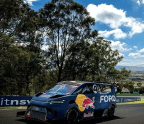
If there was anything good to come from the Covid-19 pandemic, it was how quickly the planet began to recover without the normal levels of human activity. While we were locked in our homes, skies became clearer, waterways less polluted and wildlife returned to local areas.
Within a few months of lockdowns, people in the northern Indian state of Punjab could see the Himalayas from more than 100 miles away for the first time in decades. The canals in Venice were blue, and mountain lions roamed the streets of Santiago.
Overall, the global CO emissions in 2020 dropped by 6.4 per cent, which equates to 2.3 billion tonnes of CO that didn’t enter the atmosphere. The quick recovery of Mother Nature provided hope during a very dark time, but it also bought into sharp focus the impact we have on our planet.
The good news is that since the ordeal of 2020, society has had a shift in mindset. More companies than ever are driving




